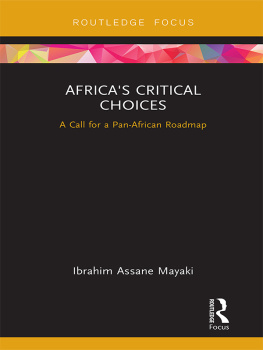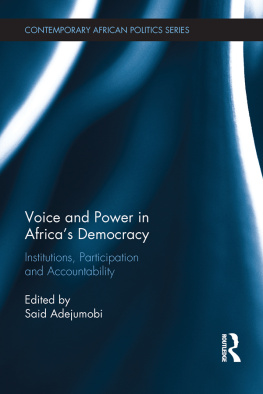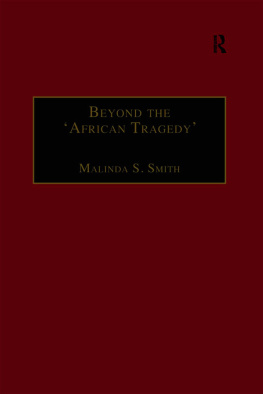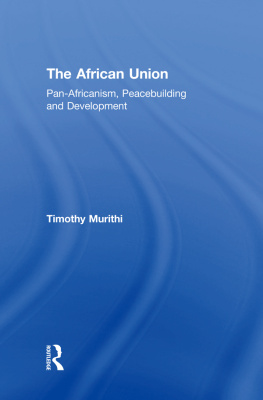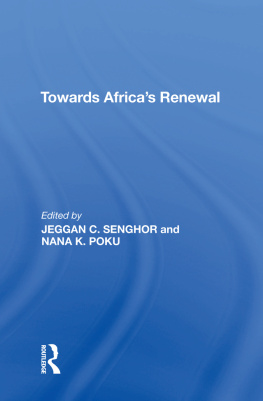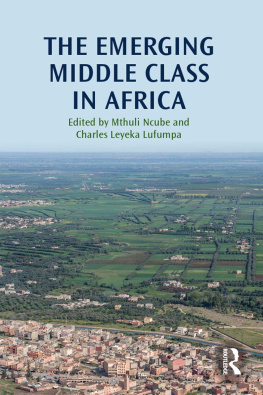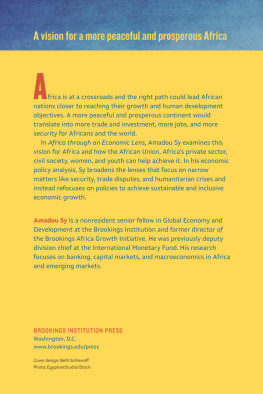Africas Critical Choices
This volume examines contemporary Africa, a vast continent which, while entering the era of globalisation, is also confronted by a number of issues, including the environment and climate change, demographics, trade issues, internal and external migration, education, economic issues, governance, and the influence of other countries. Written by former Prime Minister of Niger and current Chief Executive Officer of the Secretariat of the New Partnership for Africas Development (NEPAD), Dr Ibrahim Assane Mayaki, this book offers an overview of Africa, and looks to the next generation of leaders in the continent, aiming to offer a manifesto for future change.
Dr Ibrahim Assane Mayaki is the Chief Executive Officer of the Secretariat of the New Partnership for Africas Development (NEPAD). Born in Niger in 1951, he obtained a Masters Degree from the National School of Public Administration (Enap), Qubec, Canada and a PhD in Administrative Sciences from University of Paris I, France. He first worked as professor of Public Administration and Management in Niger and Venezuela during the periods 197882 and 198587. From 2000 to 2004, Dr Mayaki was a guest Professor at the University of Paris XI, where he lectured on international relations and organizations; he also led research at the Research Centre on Europe and the Contemporary World within that University. His political career started in 1997, when, under the presidency of Ibrahim Bare Mainassara, he joined the cabinet of Niger as Minister in charge for African Integration and Co-operation, before holding the position of Foreign Minister. He was appointed Prime Minister of the country in November 1997. He remained in charge until January 2000. As Prime Minister of Niger, Ibrahim Assane Mayaki played a catalyst role in enhancing the social dialogue in the country. He initiated the creation of relevant technical committees in charge of the negotiations with social partners. He also created the Public Policy Analysis Circle (Cercle danalyse des politiques publiques), a think tank focusing on health and education policy. He was appointed as NEPADs Chief Executive Officer in January 2009.
Europa Regional Perspectives
Providing in-depth analysis with a global reach, this series from Europa examines a wide range of contemporary political, economic, developmental and social issues in regional perspective. Intended to complement the Europa Regional Surveys of theWorld series, Europa Regional Perspectives will be a valuable resource for academics, students, researchers, policymakers, business people and anyone with an interest in current world affairs with an emphasis on regional issues.
While the Europa World Year Book and its associated Regional Surveys inform on and analyse contemporary economic, political and social developments, the Editors considered the need for more in-depth volumes written and/or edited by specialists in their field, in order to delve into particular regional situations. Volumes in the series are not constrained by any particular template, but may explore recent political, economic, international relations, social, defence, or other issues in order to increase knowledge. Regions are thus not specifically defined, and volumes may focus on small or large group of countries, regions or blocs.
Euro-Caribbean Societies in the 21st Century
Offshore finance, local lites and contentious politics
Sbastien Chauvin, Peter Clegg, and Bruno Cousin
Reconfiguration of the Global South
Africa and Latin America and the Asian Century
Edited by Eckart Woertz
Still a Western World?
Continuity and Change in Global Order
Edited by Sergio Fabbrini and Raffaele Marchetti
Parliamentary Institutions in Regional and International Governance
Functions and Powers
Andrea Cofelice
Youth at the Margins
Perspectives on Arab Mediterranean Youth
Edited by Jos Snchez Garca and Elena Snchez-Montijano
Africas Critical Choices
A Call for a Pan-African Roadmap
Ibrahim Assane Mayaki
For more information about this series, please visit: www.routledge.com/Europa-Regional-Perspectives/book-series/ERP.
First published 2019
by Routledge
2 Park Square, Milton Park, Abingdon, Oxon OX14 4RN
and by Routledge
52 Vanderbilt Avenue, New York, NY 10017
Routledge is an imprint of the Taylor & Francis Group, an informa business
2019 Routledge
The right of Ibrahim Assane Mayaki to be identified as author of this work has been asserted by him in accordance with sections 77 and 78 of the Copyright, Designs and Patents Act 1988.
All rights reserved. No part of this book may be reprinted or reproduced or utilised in any form or by any electronic, mechanical, or other means, now known or hereafter invented, including photocopying and recording, or in any information storage or retrieval system, without permission in writing from the publishers.
Trademark notice: Product or corporate names may be trademarks or registered trademarks, and are used only for identification and explanation without intent to infringe.
Originally published in France as:
LAfrique lheure des choix, by Ibrahim Assane MAYAKI
Armand Colin, 2018, Malakoff
English Translation, Armand Colin, 2018, Malakoff
ARMAND COLIN is a trademark of DUNOD Editeur 11, rue Paul Bert 92240 MALAKOFF.
Other titles: Afrique lheure des choix. English.
British Library Cataloguing in Publication Data
A catalogue record for this book is available from the British Library
Library of Congress Cataloging-in-Publication Data
Names: Mayaki, Ibrahim Assane, author. | Obasanjo, Olusegun, writer of preface.
Title: Africas critical choices: a call for a Pan-African roadmap / Ibrahim Assane Mayaki; with a preface by Olusegun Obasanjo.
Description: New York, NY: Routledge, 2019. | Series: Europa regional perspectives | Includes index. | Originally published in France as: LAfrique a lheure des choix, by Ibrahim Assane MAYAKI Armand Colin, 2018, Malakoff English Translation, Armand Colin, 2018, Malakoff.
Identifiers: LCCN 2018050786 (print) | LCCN 2018051239 (ebook) | ISBN 9780429055072 (e-Book) | ISBN 9780367150518 (hardback)
Subjects: LCSH: AfricaPolitics and government21st century. | AfricaEconomic policy. | Globalization--Economic aspectsAfrica. | Pan-Africanism.
Classification: LCC DT30.5 (ebook) | LCC DT30.5 .M28713 2018 (print) | DDC 960.33dc23
LC record available at https://lccn.loc.gov/2018050786
ISBN: 978-0-367-15051-8 (hbk)
ISBN: 978-0-429-05507-2 (ebk)
Once again, Africa is visibly a treasured continent. It is the endearment of the moment sought by world economic and financial powers from countries to development-supporting institutions. Hauntingly reminiscent of the Scramble for Africa during the period 18811914, the African continent is today the attraction for development resources and stabilisation of global security. A cursory glance at Western media coverage has become a good indicator of this trend. From one decade to the next The Economist Magazines headlines went from the brutal diagnosis that it was the hopeless continent to overly optimistic predictions that the continent has a real chance of following in the path of Asia. The disappointing statistics on African poverty and growth at the end of the 1990s and the rebound of this decade in a morose economic context and with strong political tensions in the West did not justify the excessive pessimism of the past nor does support the sometimes excessive optimism of today. There is need for balance and moderation.

